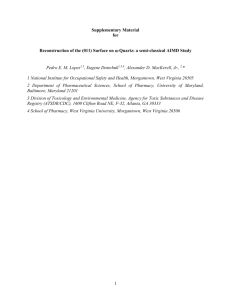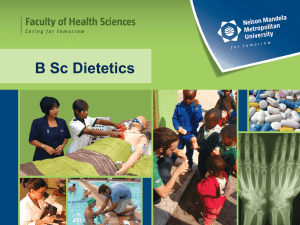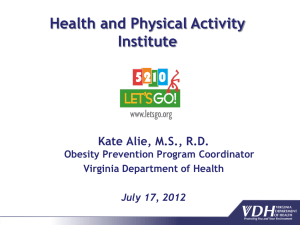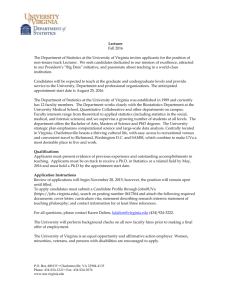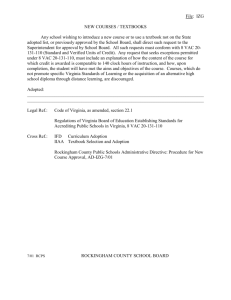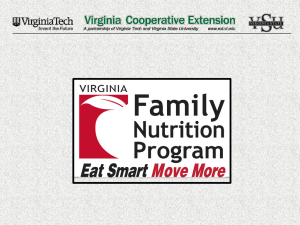Opposition Points For HB345 - Virginians For Health Freedom
advertisement
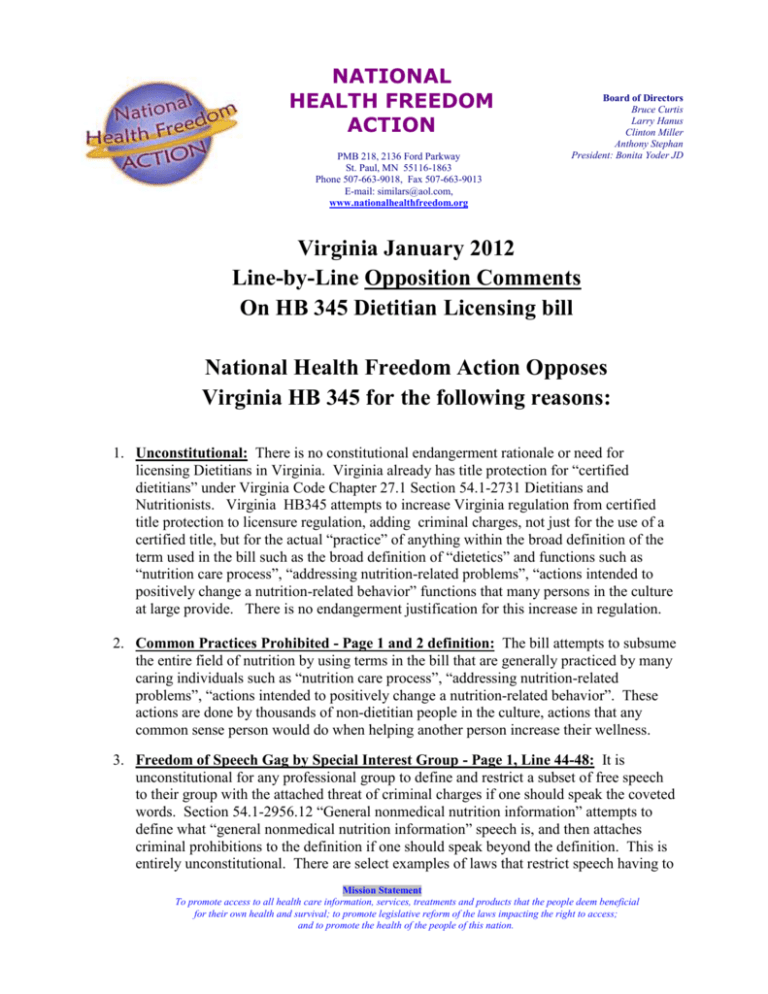
NATIONAL HEALTH FREEDOM ACTION PMB 218, 2136 Ford Parkway St. Paul, MN 55116-1863 Phone 507-663-9018, Fax 507-663-9013 E-mail: similars@aol.com, www.nationalhealthfreedom.org Board of Directors Bruce Curtis Larry Hanus Clinton Miller Anthony Stephan President: Bonita Yoder JD Virginia January 2012 Line-by-Line Opposition Comments On HB 345 Dietitian Licensing bill National Health Freedom Action Opposes Virginia HB 345 for the following reasons: 1. Unconstitutional: There is no constitutional endangerment rationale or need for licensing Dietitians in Virginia. Virginia already has title protection for “certified dietitians” under Virginia Code Chapter 27.1 Section 54.1-2731 Dietitians and Nutritionists. Virginia HB345 attempts to increase Virginia regulation from certified title protection to licensure regulation, adding criminal charges, not just for the use of a certified title, but for the actual “practice” of anything within the broad definition of the term used in the bill such as the broad definition of “dietetics” and functions such as “nutrition care process”, “addressing nutrition-related problems”, “actions intended to positively change a nutrition-related behavior” functions that many persons in the culture at large provide. There is no endangerment justification for this increase in regulation. 2. Common Practices Prohibited - Page 1 and 2 definition: The bill attempts to subsume the entire field of nutrition by using terms in the bill that are generally practiced by many caring individuals such as “nutrition care process”, “addressing nutrition-related problems”, “actions intended to positively change a nutrition-related behavior”. These actions are done by thousands of non-dietitian people in the culture, actions that any common sense person would do when helping another person increase their wellness. 3. Freedom of Speech Gag by Special Interest Group - Page 1, Line 44-48: It is unconstitutional for any professional group to define and restrict a subset of free speech to their group with the attached threat of criminal charges if one should speak the coveted words. Section 54.1-2956.12 “General nonmedical nutrition information” attempts to define what “general nonmedical nutrition information” speech is, and then attaches criminal prohibitions to the definition if one should speak beyond the definition. This is entirely unconstitutional. There are select examples of laws that restrict speech having to Mission Statement To promote access to all health care information, services, treatments and products that the people deem beneficial for their own health and survival; to promote legislative reform of the laws impacting the right to access; and to promote the health of the people of this nation. do with fraud, danger, and criminal intent, discrimination, etc. and commercial laws on labeling of products, however to blatantly carve out and prohibit a section of speech for a particular group of people, speech that is regularly used in the culture for the sustenance of the people and not harmful, is so onerous as to have created a justified uprising from Virginia citizens and consumers. 4. Criminalizing Common Behaviors - Page 2 Lines 77-88: Section 54.1-2956.14 of this bill is the most dangerous section of the bill. It is the police power section of the bill. It makes it unlawful for any person not licensed to do any of the activities listed in the definitions of dietetics. It makes not only use of title criminal without a license but also the “practice of dietetics” without a license criminal. It reflects the increased government role in enforcement because of the difference between current title protection requirements and licensure requirements. Title protection calls for the prohibition of use of title. But licensure, calls for the prohibition of “practice”. Section .14 prohibits anything within the definition of “dietetics”. Since “nutrition care process”, “addressing nutrition-related problems”, “actions intended to positively change a nutrition-related behavior” are all tied into that original definition, this bill would criminalize all of those activities, unless otherwise exempted. This bill gives the impression that dietitians own the entire field of nutrition as it relates to health and that their statute then doles out exemptions as they see fit, including an exemption for those who speak only “nonmedical” speech. For the state of Virginia to give a small group of people this massive gatekeeping power on health practices and free speech without any constitutional basis of harm, is intolerable. The largest impact to consumers that this would have is to eliminate a large percentage of their current options for information and support in their healing journeys, and would make the culture monoclonal in its approach to health and nutrition. 5. Restricting Retailer’s Freedom of Speech - Page 3, Lines 126-128: Section 54.12956.16 (8) offends Virginia retailers who are currently regulated in their speech about their products by the FDA. Virginia retailers should not have to worry about the state of Virginia being more stringent than the federal government on commercial speech. It is already legal for them to sell food, food materials, dietary supplements, or other goods to consumers when they comply with federal law so it is not the business of Virginia dietitians to tell them what they can or cannot say when engaged in selling with their customers. There should be an unconditional exemption for them. Virginia HB 345 goes beyond FDA law and attempts to put a broad speech restriction on people who sell products because it links their freedom of speech to a condition, i.e., they have freedom of speech as long as they are only furnishing “general nonmedical nutrition information”: “Exceptions to requirements for licensure as a dietitian…. 8. Any person or retailer who does not hold himself out to be a dietitian who furnishes general nonmedical nutrition information on food, food materials, or dietary supplements or on the marketing of food, food materials, or dietary supplements; [underline added]. 6. Weight Loss Programs Need to Be in Public Domain - Page 3, Line 129-133: This section should be deleted because it attempts to require all weight loss programs to be reviewed and approved by a licensed dietitian. Dietitians are not the only source of effective weight loss information and there are many that think that dietitians have not Mission Statement To promote access to all health care information, services, treatments and products that the people deem beneficial for their own health and survival; to promote legislative reform of the laws impacting the right to access; and to promote the health of the people of this nation. been successful at weight control programs in this country and the ADA has strong alliances with large sugar based corporations and conventional food outlets. Allowing a monopolistic group to manage nutrition information can negatively impact the country. Weight control should be in the purview of the public domain where approaches of all kinds can be evaluated and experienced by all consumers. 7. Absence of religious exemption: Licensing laws generally include an exemption for persons practicing according to their religious and philosophical beliefs and this bill contains no such exemption. Respectfully Submitted Diane M. Miller JD Director of Law and Public Policy National Health Freedom Action www.nationalhealthfreedom.org similar@aol.com Phone: 507-663-9018 Fax: 507-663-9013 Mission Statement To promote access to all health care information, services, treatments and products that the people deem beneficial for their own health and survival; to promote legislative reform of the laws impacting the right to access; and to promote the health of the people of this nation.
